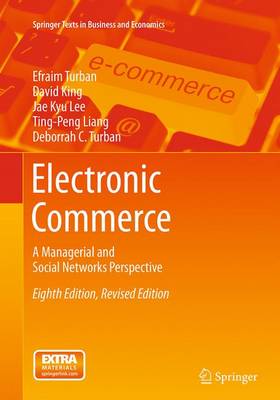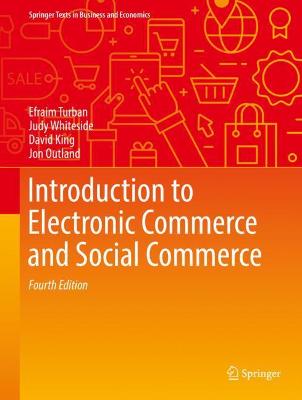Springer Texts in Business and Economics
4 total works
Electronic Commerce
by Efraim Turban, David King, Jae Kyu Lee, Ting-Peng Liang, and Deborrah C. Turban
Throughout the book, theoretical foundations necessary for understanding Electronic Commerce (EC) are presented, ranging from consumer behavior to the economic theory of competition. Furthermore, this book presents the most current topics relating to EC as described by a diversified team of experts in a variety of fields, including a senior vice president of an e-commerce-related company. The authors provide website resources, numerous exercises, and extensive references to supplement the theoretical presentations. At the end of each chapter, a list of online resources with links to the websites is also provided.
Additionally, extensive, vivid examples from large corporations, small businesses from different industries, and services, governments, and nonprofit agencies from all over the world make concepts come alive in Electronic Commerce. These examples, which were collected by both academicians and practitioners, show the reader the capabilities of EC, its cost and justification, and the innovative ways corporations are using EC in their operations.
In this edition (previous editions published by Pearson/Prentice Hall), the authors bring forth the latest trends in e-commerce, including social businesses, social networking, social collaboration, innovations, and mobility.
This is a multidisciplinary textbook on social commerce by leading authors of e-commerce and e-marketing textbooks, with contributions by several industry experts. It is effectively the first true textbook on this topic and can be used in one of the following ways:
- Textbook for a standalone elective course at the undergraduate or graduate levels (including MBA and executive MBA programs)
- Supplementary text in marketing, management or Information Systems disciplines
- Training courses in industry
- Support resources for researchers and practitioners in the fields of marketing, management and information management
The book examines the latest trends in e-commerce, including social businesses, social networking, social collaboration, innovations and mobility. Individual chapters cover tools and platforms for social commerce; supporting theories and concepts; marketing communications; customer engagement and metrics; social shopping; social customer service and CRM contents; the social enterprise; innovative applications; strategy and performance management; and implementing social commerce systems.
Each chapter also includes a real-world example as an opening case; application cases and examples; exhibits; a chapter summary; review questions and end-of-chapter exercises. The book also includes a glossary and key terms, as well as supplementary materials that include PowerPoint lecture notes, an Instructor’s Manual, a test bank and five online tutorials.
Introduction to Electronic Commerce and Social Commerce
by Efraim Turban, Judy Whiteside, David King, and Jon Outland
This is a complete update of the best-selling undergraduate textbook on Electronic Commerce (EC). New to this 4th Edition is the addition of material on Social Commerce (two chapters); a new tutorial on the major EC support technologies, including cloud computing, RFID, and EDI; ten new learning outcomes; and video exercises added to most chapters. Wherever appropriate, material on Social Commerce has been added to existing chapters. Supplementary material includes an Instructor’s Manual; Test Bank questions for each chapter; Powerpoint Lecture Notes; and a Companion Website that includes EC support technologies as well as online files.
The book is organized into 12 chapters grouped into 6 parts. Part 1 is an Introduction to E-Commerce and E-Marketplaces. Part 2 focuses on EC Applications, while Part 3 looks at Emerging EC Platforms, with two new chapters on Social Commerce and Enterprise Social Networks. Part 4 examines EC Support Services,and Part 5 looks at E-Commerce Strategy and Implementation. Part 6 is a collection of online tutorials on Launching Online Businesses and EC Projects, with tutorials focusing on e-CRM; EC Technology; Business Intelligence, including Data-, Text-, and Web Mining; E-Collaboration; and Competition in Cyberspace.
Electronic Commerce 2018
by Efraim Turban, Jon Outland, David King, Jae Kyu Lee, Ting-Peng Liang, and Deborrah C. Turban
This new Edition of Electronic Commerce is a complete update of the leading graduate level/advanced undergraduate level textbook on the subject. Electronic commerce (EC) describes the manner in which transactions take place over electronic networks, mostly the Internet. It is the process of electronically buying and selling goods, services, and information. Certain EC applications, such as buying and selling stocks and airline tickets online, are reaching maturity, some even exceeding non-Internet trades. However, EC is not just about buying and selling; it also is about electronically communicating, collaborating, and discovering information. It is about e-learning, e-government, social networks, and much more. EC is having an impact on a significant portion of the world, affecting businesses, professions, trade, and of course, people.
The most important developments in EC since 2014 are the continuous phenomenal growth of social networks, especially Facebook , LinkedIn and Instagram, and the trend toward conducting EC with mobile devices. Other major developments are the expansion of EC globally, especially in China where you can find the world's largest EC company. Much attention is lately being given to smart commerce and the use of AI-based analytics and big data to enhance the field. Finally, some emerging EC business models are changing industries (e.g., the shared economy models of Uber and Airbnb). The 2018 (9th) edition, brings forth the latest trends in e-commerce, including smart commerce, social commerce, social collaboration, shared economy, innovations, and mobility.



